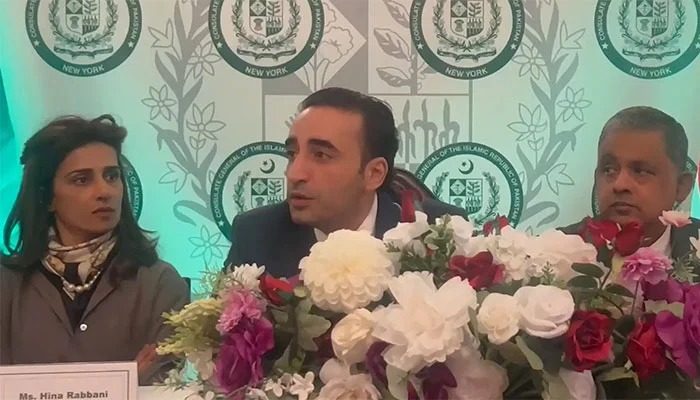Bilawal Bhutto Zardari declared the cause above politics or ego, urging unity by framing the struggle as a fight for Pakistan’s future, not personal gain

By Amjad Qaimkhani
NEW YORK: In an impassioned address to the Pakistani community in New York, Bilawal Bhutto Zardari, the chairman of the Pakistan People’s Party and head of Pakistan’s diplomatic mission, urged overseas Pakistanis to stand with him—not for political allegiance or personal ambition, but for what he described as a shared struggle for the country’s future. Speaking with a tone that mixed urgency with resolve, Bilawal made it clear that the stakes had moved far beyond party lines.
“We are not here representing a party or pursuing a personal agenda,” he told the audience. “This struggle is for Pakistan, and we need your support in it.” The message was as much a call to action as it was a reassurance that the country’s diplomatic narrative abroad must reflect unity, not division. He described his diplomatic efforts as rooted in peace and transparency, while also challenging the diaspora to take up an active role in countering what he said was a campaign to destabilise Pakistan from within and without.
Bilawal encouraged the diaspora to speak up in their own communities and institutions about what he termed a conspiracy against the state. “We want your help in unmasking the forces working against the country,” he said. “This is not just our duty — it must become a collective voice.” His appeal carried both emotional and strategic weight, aiming to reframe the conversation among Pakistanis abroad who often find themselves caught between home and host country narratives.
Turning to recent developments in the region, Bilawal delivered a sharp condemnation of India’s actions on the night of May 7. He accused New Delhi of violating international law and breaching the UN Charter by targeting civilian areas in Pakistan. “India targeted Pakistan’s civilian population, our water sources, and even our mosques,” he said, visibly moved as he described the deaths of innocent citizens, including women and children. His words reflected a growing sense of diplomatic urgency in Islamabad, where officials are increasingly seeking international attention on cross-border incidents.
Bilawal’s remarks come at a time when Pakistani diplomacy is attempting to shift gears—away from reactive postures and towards a broader, more inclusive engagement with the global Pakistani community. His speech was less about partisanship and more about building a coalition of concern, especially in the face of mounting regional pressures and growing insecurity.



